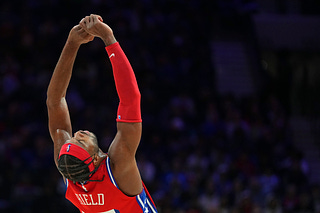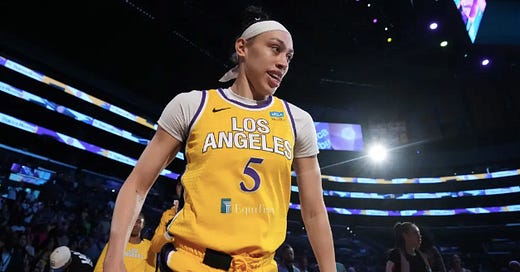

Discover more from BASKETBALL FEELINGS
What is the value of women?
If you think this is a trick question consider, for a moment, the trick of it for women, or any body identifying as one, most days of their lives.
Awful to have a question you inherently know the answer too (immeasurable, the answer is immeasurable) and be told, sometimes several times a day, that your calculations are off. The means of correction are not always gentle. A sneer, a shove, short and sharp words flung with intent. Corrections that escalate into overhauls that involve authorities, often with little to no base knowledge of the math that got you there. Even the corrections that come across affable by comparison — the figurative or vocal pat on the head, a bland smile of reassurance that confirms I have not listened to a word you’ve just said — can make you want to peel your skin off.
The proof of it is in your bones, sometimes on or split through them, but it’s a carried proof deep in your body and still, when it gets demanded (it’s never really just asked for) can conjure the same anxiety as being put on the spot for multiplication drills when you were a kid.
The proof of it — because there is, even among the best intentions, a little light of doubt that goes off when you say proof is innate, even if it’s something like 24 women per minute in the U.S. and one per minute in Canada being the victims of rape, physical violence or stalking by an intimate partner kind of innate — is in the overturning of Roe v. Wade. Proof that frankly felt impossible or at least, for a while, was protected by the bluff of a visceral, pointed and weaponized hatred for women being considered passé.
The proof of it, in sports, in basketball, as a woman in sports and in basketball, makes its comfortable, tidy home in the numbers. In the first and still most urgent reaction for some people to the news of Miles Bridges being arrested for felony domestic violence being that he, up for a significant new contract with the Hornets or elsewhere, “fumbled the bag”. Not in his actions or their affects, but in their timing. The implication being, if he only could have waited a few days after free agency started, been quieter about inflicting bodily harm, or committed domestic violence instead of felony level domestic violence (factors that escalate the qualification: a weapon is involved, bodily harm is inflicted, a child witnesses the assault, there are prior instances of abuse) then the numbers — multimillions of them — would better shield him.
In sports the numbers are armament for men, liability for women. The richer a pro athlete, the more he can afford to pay to offset, to settle, to silence and the more a woman with conclusive and valid proof of bodily harm inflicted by said-pro athlete is out to get him. The numbers, even in the way we report on abuse and assault, are buffers. Stat lines of an athlete’s last or occasionally career-best season to close out what should be strict news items, like those that are quickly piling up about Bridges, act only as a supportive framing of violence.
It feels insane to link out to so many things I’ve written about the same thing, but then it feels insane to write them, again and again. More so that the one flimsy, mitigating response I have for myself in the face of violence and the blithe disregard of it in basketball is to write about it.
The real value of women in this space is still most profoundly as a backdrop. I don’t just mean this as bodies that absorb violence, or the quick flurry of stories about the violence that will centre them in its immediate aftermath, where men like Bridges will be cast against anonymous women we understand to be there, bearing the brunt of a life briefly (in the moment) coming apart, who will go on to pick up the pieces and never quite be able to get out of the larger, always eclipsing shadow of a “career derailed” or worse, a redemption arc.
I mean it, too, for women in the professional world revolving around basketball, like me, who watch, always, the appropriately solemn motions of their male colleagues and counterparts for the acceptable amount of time before they flip back to gleefully discussing imaginary trades and the projected impact of men when the very real effects of one are still rippling out. Women, like me, who watch the men who are best at this blithe amnesia move on and up in their careers because there is a codified language of just enough and too much in this world set by the people who support and protect what feels familiar to them, and those are the people on top.
It’s a kind of erasure, every time, to feel like you are the last one in an already deafening echo chamber pointing at or talking about assault, abuse, accountability and all the ways you are being hollowed out anew each time this happens. Left to question, intently, what the purpose of this and your part in it actually is, while the collective boys club of sports media turns away, closes their circle and squares their shoulders to better support one another, intent on the more compelling ramifications of cash considerations.
What is the value of a woman? I can tell you, we’ve been telling you, but it’s beginning to feel like — as much as a lifetime’s worth of repetition can feel novel — that it’s never going to matter.
Subscribe to BASKETBALL FEELINGS
Reconciling life with basketball, or else the other way around.















Thank you for writing this.
Heartbreaking but, as usual, beautifully said.